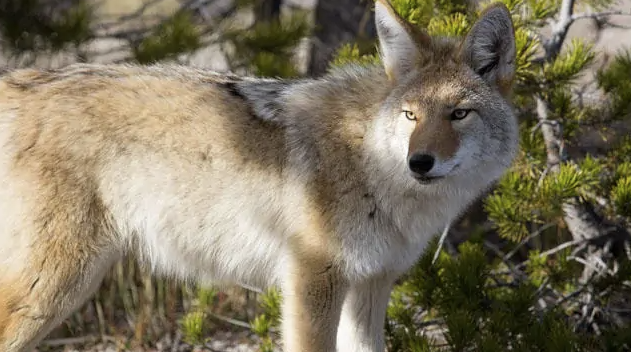While most people know that coyotes are common in the city, that fact often gives people pause in the face of a tragedy.
According to a recent City News article, a Mississauga woman is appealing to the city for help following a tragic, fatal coyote attack on Dexter, her family’s Maltese/Yorkie mix. The suspected attack occurred in the Lorne Park area around 7:00 a.m. on Tuesday, Jan. 31.
Сoyote attacks
While most people will never suffer coyote attacks, pets are at risk. Back in the fall, a Mississauga resident took to Reddit to tell a familiar but frightening story.
According to the post, pet owner was walking his or her dog on Oct. 9 at 6:30 a.m. when a coyote appeared and began tracking the pet. The early morning walk took place in a forested area just south of Burnhamthorpe near Webb Drive and, fortunately, ended without incident when the walker scared the animal off.
Other pet owners, much like Dexter’s family, have not been so lucky.
Last fall, dog owners in the Beaches area in Toronto were told to be extra vigilant after a woman’s pet was taken from her backyard.
While high-profile attacks on pets — especially animals that should, for all intents and purposes, be safe in their private, fenced-in yards — are horrifying, they are not new. Coyotes are common in urban areas and are frequently seen in Mississauga. Much like skunks and squirrels and raccoons, they’re not going anywhere and might make more appearances in dense spaces because residents (sometimes unknowingly, to be fair) provide food for them, even though feeding wildlife is actually prohibited by a city bylaw.
While a certain degree of hysteria hits when coyote attacks occur, it is important to be aware that attacks on humans are very rare and that you absolutely can take steps to safeguard your pets.
Сoncerned
It’s also crucial to remember that coyotes do serve a purpose.
According to Mississauga Animal Services, coyotes are an important part of the urban ecosystem because they control rodent and rabbit populations (sad for the tiny rodents and adorable bunnies). They tend to hunt after dusk and before dawn, so you’re unlikely to encounter one while you’re out and about with your dog during the day.
While people are often concerned that a coyote might attack a human (namely a child or small adult), the risk is low.
Typically, coyotes shy away from humans, but are known to watch and follow people from afar out of natural curiosity. If you display an aggressive action while being watched by a coyote (such as yelling or moving quickly), there’s a good chance it will become frightened and leave.
When it comes to urban coyotes, the chief concern almost always revolves around house pets. Shy or not, coyotes will hunt pets who are off-leash or otherwise unattended outdoors.
So, what do you do if you encounter a coyote while walking your dog?
According to Mississauga Animal Services, it’s best to stay calm and wait for the animal to retreat. If you give into your instinct to turn and run from the petite but quick-footed beasty, it will chase you and your pet (much like a domestic dog would). If the animal continues to approach you, it’s best to stand tall and waive your arms and make yourself as tall as possible.
You can also clap, shout, make startling movements or throw objects in the coyote’s general direction. If you behave aggressively and erratically, the coyote will likely run off. That said, do not approach or attempt to chase the animal — that is extremely dangerous and may provoke an attack. You can also startle your furry stalker by opening an umbrella, using a flashlight (you should always carry a flashlight during nighttime walks in unlit areas) or activating an alarm or other loud noise on your phone. If you try to scare the animal away but still feel you are at imminent risk of attack, call 911.
If you see a coyote that appears injured or ill and you want to help, do not attempt to touch or move the animal yourself. You can report distressed coyotes by calling 905-896-5858.
All that said, you’ve probably read about savage coyote attacks on people and are still worried about your own safety.
Fortunately
An attack should not be high on your list of concerns. According to the Humane Society of The United States, you are more likely to be killed an errant golf ball or flying champagne cork than a coyote. Most attacks occur when humans are feeding coyotes or intervening in an attack on a smaller animal (often — and most tragically — their pet). Sometimes, people are bitten by coyotes that they have cornered (which is why you should never, ever attempt to attack the animal). On rare occasions, rabid coyotes bite people unprovoked.
In terms of fatal attacks, they are almost unheard of. There are currently only two known incidents of people being killed by coyotes. In the 1980s, a child was killed by an animal in Southern California and in 2009, a young Toronto woman was fatally attacked in Nova Scotia.
At this point, absolutely no reputable organization is recommending an urban coyote cull (mass killing) because they’re not a significant threat to city residents.
Since it’s unlikely that you will be your local coyote’s next victim, it’s important to focus on protecting your pets.
According to the Ontario Ministry of Natural Resources and Forestry, you can safeguard your home by installing flashing lights, motion sensors and noise makers and erecting a tall fence (although you’ll have to ensure its height doesn’t violate local bylaws).
Tips
According to the city of Mississauga, you should also try to store garbage indoors until collection day or tightly lock and secure receptacles (animals that are around humans a lot because of nearby food sources ultimately become less afraid of them, increasing the risk of an encounter). You should also carefully clean your BBQ grill and tools to reduce traces of food and refrain from giving your cat or dog their food outdoors.
If you have a dog or cat that you are worried about, you should keep them indoors at night and ensure your yard is free from pet waste (coyotes are attracted to dog feces). You should also spay and neuter your dogs because coyotes may try to mate with them otherwise.
You can also keep your pets safe by keeping your dog on a short leash and discouraging it from chasing wildlife. You should also inspect your yard for coyotes before letting your pet outside — especially at night.
All in all, be vigilant but not paranoid. It is highly unlikely that a coyote will attack you or your children and you can take common sense steps to ensure your pets are safe.

